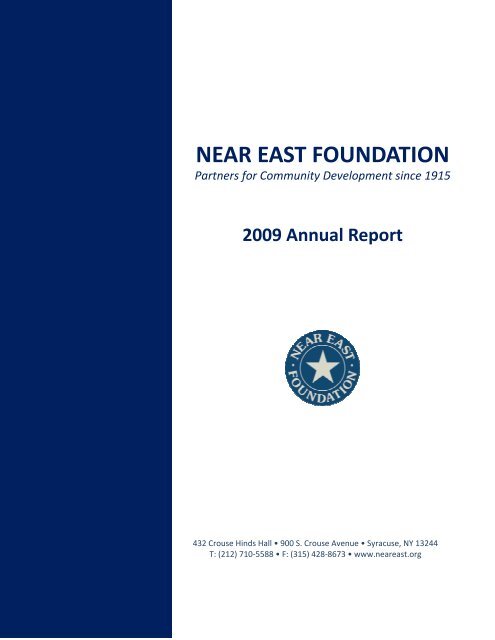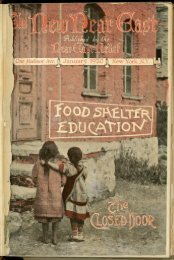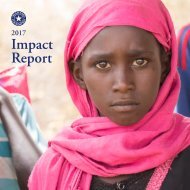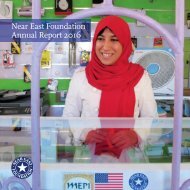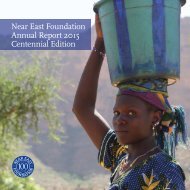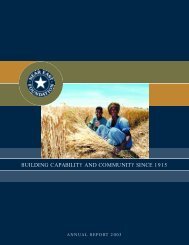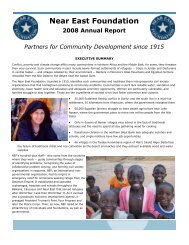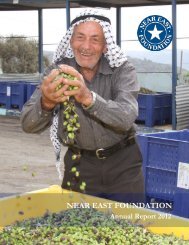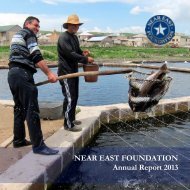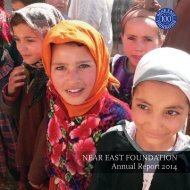Near East Foundation 2009 Annual Report
Create successful ePaper yourself
Turn your PDF publications into a flip-book with our unique Google optimized e-Paper software.
NEAR EAST FOUNDATION<br />
Partners for Community Development since 1915<br />
<strong>2009</strong> <strong>Annual</strong> <strong>Report</strong><br />
432 Crouse Hinds Hall • 900 S. Crouse Avenue • Syracuse, NY 13244<br />
T: (212) 710-5588 • F: (315) 428-8673 • www.neareast.org
<strong>Near</strong> <strong>East</strong> <strong>Foundation</strong><br />
<strong>2009</strong> <strong>Annual</strong> <strong>Report</strong><br />
For 95 years, the <strong>Near</strong> <strong>East</strong> <strong>Foundation</strong> (NEF) has worked to improve conditions of the most vulnerable<br />
communities in the Middle <strong>East</strong> and Africa. Their vulnerability is rooted in chronic poverty, conflict,<br />
migration and climate change. In 1915, NEF was created to provide refuge and relief to Armenians facing<br />
persecution during the disintegration of the Ottoman Empire. Today, the vulnerable communities with<br />
which NEF works take many forms:<br />
Marginalized social groups – young people in Morocco’s peri-urban slums, residents of “poverty<br />
pockets” in rural Jordan;<br />
Villages isolated by their environment – Berbers in Morocco’s Atlas Mountains, Malians facing an<br />
encroaching desert, Egyptian farmers relocated from the Nile Delta, and rural Armenians cut off<br />
from economic opportunity; and<br />
People fleeing conflict – Iraqis in Jordan and Syria, Palestinians in the West Bank and Darfurians in<br />
central Sudan.<br />
What these groups hold in common is that they are excluded from opportunities for economic and social<br />
advancement taking place around them. They lack the power to influence public decision-making and<br />
access to educational opportunities. They are left behind, caught in “poverty traps” that prevent them<br />
from investing in their own economic or social development.<br />
KNOWLEDGE, VOICE, AND ENTERPRISE. NEF assists its local partners to participate more fully in the<br />
development of their countries—to build the lives they envision for themselves. Through a range of<br />
training, technical assistance and material support, NEF helps vulnerable communities:<br />
Access KNOWLEDGE necessary to participate fully in civic and economic life through education, job<br />
training, and literacy programs<br />
Amplify their collective VOICE through community organizing and institutional strengthening<br />
initiatives<br />
Create ECONOMIC OPPORTUNITY through enterprise development, micro-credit, and improved<br />
agricultural and natural resource management<br />
THE NEAR EAST FOUNDATION DIFFERENCE. With an annual budget of approximately $6 million, NEF<br />
maintains offices and programs in Armenia, Egypt, Jordan, Mali, Morocco, Palestine and Sudan. In the field,<br />
approximately 85 NEF staff members—all of whom are from the countries in which they work—work<br />
closely with local organizations to mobilize vulnerable communities to find homegrown solutions to their<br />
problems. A small staff based in the US provides program development, project management, and<br />
administrative support to teams in the field. NEF is particularly effective at working in difficult settings for<br />
several reasons:<br />
<strong>Near</strong> <strong>East</strong> <strong>Foundation</strong> * 432 Crouse Hinds Hall * 900 S. Crouse Avenue * Syracuse, NY 13244 * T: (212) 710-5588 * F: (315) 428-8673
Decentralization. NEF’s decentralized structure empowers local development professionals. Most<br />
of our technical capacity and programming capacity resides with the teams in the field. This allows<br />
NEF to design initiatives that are especially responsive to local need and tailored to local conditions.<br />
Our field programs evolve organically with the changing nature of local development challenges, as<br />
reflected in the growing importance of urban poverty reduction initiatives in Morocco (Casablanca),<br />
Egypt (Cairo), and Jordan (Zarqa).<br />
Relationships. NEF has sustained its presence in partner countries and communities over many<br />
years. These long-term relationships give us intimate knowledge of local circumstances and<br />
challenges. Just as important, the relationships and NEF’s local reputation are a foundation for trust<br />
with groups that are often difficult to reach—such as residents of remote villages in Morocco’s High<br />
Atlas Mountains, refugees in urban Jordan, and Palestinian farmers in the West Bank.<br />
Innovation. NEF’s local capacity and long-standing relationships enable NEF to pilot and refine<br />
innovative solutions to local development challenges. While our activities are rooted in grassroots<br />
action, the approaches and tools we develop gain traction far beyond the communities in which we<br />
work. For example, local natural resource management bylaws, developed by NEF and its partners<br />
in northern Mali, are now common elements of development practice throughout West Africa.<br />
NEF’s locally adapted models for micro-credit and small enterprise development are now widely<br />
used by NGOs throughout Jordan. And NEF’s model of engaging communities to increase girls’<br />
education, piloted in a handful of villages in the High Atlas Mountains, is now used across southern<br />
Morocco and is on the cusp of expansion to the national level.<br />
<strong>2009</strong> ACHIEVEMENTS. NEF’s interventions are designed to address challenges associated with<br />
knowledge, voice, and enterprise in a sustained and holistic manner. The following examples illustrate<br />
our achievements in <strong>2009</strong>.<br />
VOICE<br />
Many of NEF’s local partners have been excluded from public decision-making due to poverty, lack of<br />
education, or geographic isolation. They have no seat at the table, and their lack of political power is both<br />
cause and effect of vulnerability. NEF helps establish and strengthen local organizations so they can take<br />
collective action and represent their members more effectively.<br />
Morocco Urban Youth Development. Under a 3-year cooperative agreement with the US Agency for<br />
International Development (USAID), NEF is supporting the formation of youth associations in some of the<br />
most difficult peri-urban slums in Casablanca. These associations provide a vehicle for young people to<br />
communicate their problems and aspirations and to play a more active role in their communities. NEF has<br />
trained 150 young people in leadership and supported 18 youth committees.<br />
<strong>Near</strong> <strong>East</strong> <strong>Foundation</strong> * 432 Crouse Hinds Hall * 900 S. Crouse Avenue * Syracuse, NY 13244 * T: (212) 710-5588 * F: (315) 428-8673
Girls Education (Morocco). A cornerstone of NEF’s approach to<br />
girls’ education in rural Morocco is leadership from Parent-<br />
Teacher Associations. With support from the US Middle <strong>East</strong><br />
Partnership Initiative (MEPI), NEF has helped revive and<br />
strengthen 38 PTAs across southern Morocco and increased<br />
parental participation by 50 percent. NEF has supported income<br />
generating projects in 12 of these communities, which now earn<br />
profits of $30,000 annually to invest in their schools.<br />
Local Economic Development (Jordan). With support from<br />
Jordan’s Ministry of Planning and International Cooperation, NEF<br />
is managing a $4.23 million project to stimulate economic development in six of the poorest regions of<br />
Jordan. In partnership with the royal NGO, JOHUD, NEF trains local community associations in<br />
organizational management and economic development. These associations then catalyze and guide<br />
activities to stimulate local economic growth and to support social and physical infrastructure.<br />
KNOWLEDGE<br />
Without basic knowledge, urban and rural poor alike have little prospect of taking advantage of new<br />
opportunities for employment and self-improvement. Their poverty and vulnerability to exploitation<br />
persists—often while society around them prospers. NEF education and training programs increase access<br />
to the basic knowledge needed to participate more fully in civic life and take advantage of economic<br />
opportunities.<br />
Girls Education (Morocco). Since 2004, NEF has spearheaded a<br />
bold initiative to increase girls’ attendance and overall school<br />
retention in some of the most remote villages in rural<br />
southern Morocco. Through a strategy of community<br />
mobilization, strengthening of parent teacher associations,<br />
curricular reform, infrastructure improvement, and revenue<br />
generation, NEF has helped increase girls’ primary school<br />
attendance from 50 percent to 98 percent and increased<br />
primary school completion for all children from 10 percent to<br />
95 percent.<br />
Kindergarten Development (Palestinian Territories). In collaboration with international and local NGO’s,<br />
NEF is leading a comprehensive program to improve kindergarten education in the West Bank, including<br />
curriculum, teacher training and infrastructure development. We continued our three-year collaboration<br />
with the World Food Program to supplement the nutrition of Palestinian school children. Through this<br />
program, NEF delivers enriched WFP commodities to twenty-four women’s enterprise centers where 2,000<br />
women produce enriched snacks for distribution to kindergartens and primary schools. The program serves<br />
<strong>Near</strong> <strong>East</strong> <strong>Foundation</strong> * 432 Crouse Hinds Hall * 900 S. Crouse Avenue * Syracuse, NY 13244 * T: (212) 710-5588 * F: (315) 428-8673
approximately 54,000 students in 189 kindergartens and 100<br />
primary schools in the northern and central West Bank. With<br />
support from the US, Danish and Sharjah (AUE) governments,<br />
NEF renovated sanitary facilities, playgrounds and classrooms<br />
in several kindergartens.<br />
Reproductive Health (Egypt). In four diverse communities<br />
across Egypt, NEF works with highly vulnerable 12-18 year-old<br />
Egyptian who live on the street or are forced to work to<br />
provide income for their families. Misconceptions about<br />
sexuality are widespread among adolescents and youth, and sexual practices put their reproductive and<br />
general health at risk. With support from the Ford <strong>Foundation</strong>, NEF is helping improve the quality of health<br />
and well-being among poor urban youth through training in leadership, life skills, and sexuality.<br />
Economic Opportunity<br />
NEF helps vulnerable people gain the knowledge and skills to earn a meaningful living and lift themselves<br />
out of poverty. We achieve this through technical assistance to improve productivity, job training, business<br />
development training, and micro-credit. Our approach to creating economic opportunity takes many<br />
forms—agriculture and natural resource management, value added processing, small-scale commerce, and<br />
local service delivery—reflecting the social and economic realities of our local partners.<br />
Micro-Economic Development (Armenia). NEF returned to<br />
Armenia in January <strong>2009</strong> to launch a comprehensive microeconomic<br />
development and job creation program in Tavush<br />
Marz and Gegharkunik Marzes. In partnership with Armenia<br />
Fund USA and local organizations, NEF’s integrated approach<br />
to local economic development in rural Armenian villages<br />
employs technical support for micro-enterprise, microcredit<br />
for small businesses, and micro-franchising for sectors that<br />
have high-potential at a regional level. In this pilot phase, NEF<br />
supported initial sector/competitiveness analyses, business<br />
development training for 53 small entrepreneurs, and<br />
assistance in preparing 35 business plans in areas as diverse as<br />
livestock, fish farming and fruit and vegetable production.<br />
Agriculture and Natural Resource Management (Mali). Since<br />
early 2008, with support from the Dutch NGO NOVIB, NEF has<br />
assisted the inhabitants of 46 villages to cope with changes in<br />
rainfall, temperature and river flow in Mali’s inland delta. The<br />
project introduced measures for improved natural resource<br />
<strong>Near</strong> <strong>East</strong> <strong>Foundation</strong> * 432 Crouse Hinds Hall * 900 S. Crouse Avenue * Syracuse, NY 13244 * T: (212) 710-5588 * F: (315) 428-8673
management to approximately 50,000 people from diverse groups (farmers, herders, fishermen, and<br />
artisans), local government officials and local NGO staff members. NEF works with producers to improve<br />
farm efficiency, increase productivity, and expand marketing and distribution channels, with a focus on<br />
improving competitiveness in the agricultural sector and supporting sustainable increases in production.<br />
Urban Youth Development (Morocco). NEF provides leadership and job skills training in partnerships with<br />
local firms to improve employment opportunities for resident youth. NEF also provides training and<br />
facilitates micro-credit to help out-of-school youth develop small enterprises. Through June <strong>2009</strong>, NEF<br />
trained 150 young men and women in life skills and leadership, placed 20 people in internships, helped<br />
prepare business plans and credit applications for 40 small enterprises, and established an SMS-based<br />
employment information system for use by 600 youth.<br />
Women’s Micro-credit (Mali). NEF has improved the financial<br />
security of thousands of people in the Mopti region by<br />
providing them with vocational training and access to credit.<br />
NEF established a women’s micro-finance bank, Nayral/NEF,<br />
which is now run as an independent financial institution.<br />
Nayral/NEF has lent $5.3 million to approximately 25,000<br />
women to support small and medium businesses, with a<br />
repayment rate of 98 percent. NEF continues to give<br />
management assistance and provide some loan guarantees.<br />
Agricultural Development (Egypt). Since 2005, NEF has<br />
operated a pilot agriculture extension project in three villages<br />
in the southwestern desert. The Egyptian government plans to<br />
resettle one million people to this area over the next ten years.<br />
NEF’s project includes a nursery and experimental fields, where<br />
2,500 participating farming families select appropriate<br />
varieties, seeds, planting cycles and methods and fertilizer and<br />
pesticide use. NEF emphasizes an ecological approach to<br />
agriculture, along with value-added production and access to<br />
markets. NEF has helped producers of high-value horticultural<br />
products obtain access to European markets through training and technical assistance to meet EUREPGAP<br />
standards.<br />
Local Economic Development (Jordan). NEF worked with residents, private sector consultants, and<br />
Government of Jordan authorities to assess potential investments to jump-start economic activity in rural<br />
“poverty pockets.” NEF provides training in business development and management and works through<br />
community associations to create new businesses in agriculture and commerce. NEF manages a grant fund<br />
and provides lending facilities for entrepreneurs.<br />
<strong>Near</strong> <strong>East</strong> <strong>Foundation</strong> * 432 Crouse Hinds Hall * 900 S. Crouse Avenue * Syracuse, NY 13244 * T: (212) 710-5588 * F: (315) 428-8673
REACHING THE MOST VULNERABLE<br />
The most vulnerable—refugees and internally displaced people (IDPs)—often require a combination of<br />
direct relief and long-term development efforts. NEF’s work to bridge the relief-to-development transition<br />
goes back to our earliest days. Frequently, one of the biggest challenges is simply identifying and reaching<br />
out to these communities. For example, Iraqi refugees in Jordan disappear into the communities in which<br />
they resettle. Unable to work legally or to access social services such as schools and clinics in some cases,<br />
they exist in economic limbo or accept illegal work that exposes them to a variety of threats. The<br />
communities with which they find refuge are themselves in great need, and special care must be taken to<br />
address the specific needs of refugees while also reaching out to their host communities. This is the case<br />
with Iraqi refugees in both Jordan and Syria.<br />
Internally Displaced People (Sudan). In Sudan, NEF works with<br />
refugees from Darfur and the war-torn South who have found<br />
refuge in the dusty village of Dar es-Salam, 40 kilometers from<br />
Khartoum. NEF built and continues to support a clinic that is<br />
the sole source of healthcare for this community of 40,000<br />
people. The clinic currently serves over 1,000 patients per<br />
month by providing general treatment, laboratory testing, preand<br />
post-natal care, vaccination and nutrition and HIV/AIDS<br />
awareness activities.<br />
Iraqi Refugees (Jordan). NEF partnered with six community-based organizations in Jordan’s second largest<br />
city, Zarqa, to provide relief aid, social services, and psycho-social support for Iraqi refugees and Jordanian<br />
host communities. NEF and its local partners were able to deliver targeted humanitarian assistance to over<br />
2,000 households (about 10,000 people), 62% of which were Iraqi refugees. NEF coordinated 13<br />
humanitarian relief campaigns and three sustainable community service projects--beauty salon and<br />
industrial sewing classes for women, an indoor playground for children, and a computer and cell phone<br />
maintenance training center for men.<br />
Iraqi Refugees (Syria). In Syria, NEF undertook a<br />
comprehensive effort to enable Iraqi refugee and vulnerable<br />
Syrian women and girls to stabilize their well-being and<br />
livelihoods. With support from private foundations in the US<br />
and in coordination with the Center for Development Services,<br />
the Syrian Ministry of Health and the Syrian Women's General<br />
Union, NEF provided reproductive health and alternative<br />
livelihood programs to female Iraqi refugees in Damascus,<br />
seeking to reduce prostitution and forced labor. NEF<br />
conducted 145 reproductive health awareness sessions for<br />
327 participants and trained Syrian doctors and nurses, as well as Iraqi volunteers, to conduct the<br />
workshops and provide ongoing counseling. NEF and its partners conducted psycho-social counseling<br />
<strong>Near</strong> <strong>East</strong> <strong>Foundation</strong> * 432 Crouse Hinds Hall * 900 S. Crouse Avenue * Syracuse, NY 13244 * T: (212) 710-5588 * F: (315) 428-8673
sessions and group therapy for 171 Iraqi women and adolescent girls in areas such as pervasive domestic as<br />
well as sexual and gender-based violence. To support alternative livelihoods, NEF and its partners<br />
conducted five training workshops on small business development for 124 beneficiaries.<br />
BOARD OF DIRECTORS<br />
Shant Mardirossian, Chair<br />
Shahnaz Batmanghelidj, Vice-Chair<br />
Alexander Papachristou, President<br />
Ronald E. Miller, Treasurer<br />
Haig Mardikian, Secretary<br />
Charles E. Benjamin, Ph.D.<br />
Amir Ali Farman-Farma, Ph.D.<br />
Johnson Garrett<br />
John Goelet<br />
John Grammer<br />
John M. Kerr, Ph.D.<br />
David W. Mize<br />
Abe Moses<br />
Thomas D. Mullins<br />
Richard Robarts<br />
Timothy Rothermel<br />
Michaela Walsh<br />
Anthony Williams<br />
Tarek Younes<br />
PRESIDENT'S COUNCIL<br />
H.E. André Azoulay<br />
Ambassador Edward P. Djerejian<br />
Vartan Gregorian, Ph.D.<br />
Linda K. Jacobs, Ph.D.<br />
Ambassador Richard W. Murphy<br />
Her Majesty Queen Noor of Jordan<br />
Ambassador Frank G. Wisner<br />
<strong>Near</strong> <strong>East</strong> <strong>Foundation</strong> * 432 Crouse Hinds Hall * 900 S. Crouse Avenue * Syracuse, NY 13244 * T: (212) 710-5588 * F: (315) 428-8673
Statement of Financial Position at June 30, <strong>2009</strong> Statement of Activities Year ended June 30,<strong>2009</strong><br />
ASSETS<br />
REVENUES & OTHER SUPPORT<br />
Cash & equivalents 969,423 Contributions 1,017,476<br />
Grants & Contracts receivable 169,391 Government 894,790<br />
Accounts & loans receivable 606,102 Private Grants 2,014,039<br />
Investments & investments in trust 530,427 In Kind Contributions 245,132<br />
Other current assets 44,320 Program related 260,589<br />
Fixed assets net 94,573 Other including investment (83,028)<br />
2,414,236 4,348,998<br />
LIABILITIES & NET ASSETS<br />
EXPENSES<br />
Current liabilities Program Services 4,623,430<br />
Accounts payable & accrued expenses 531,667 Management & General 736,852<br />
Refundable advances 139,333 Fund-raising 265,598<br />
671,000 5,625,880<br />
Net Assets Net Surplus (1,276,882)<br />
Unrestricted 686,653<br />
Temporarily restricted 721,198<br />
Permanently restricted 335,385<br />
Total net assets 1,743,236<br />
Total 2,414,236<br />
<strong>Near</strong> <strong>East</strong> <strong>Foundation</strong> * 432 Crouse Hinds Hall * 900 S. Crouse Avenue * Syracuse, NY 13244 * T: (212) 710-5588 * F: (315) 428-8673


